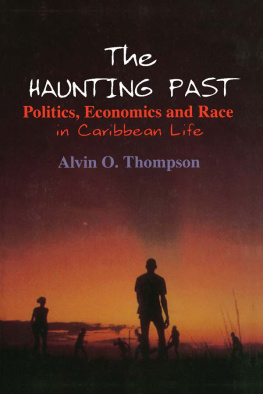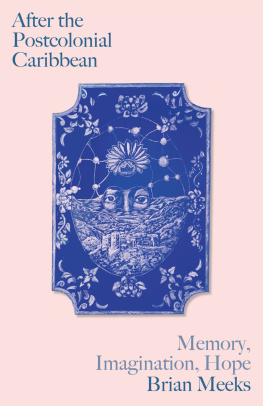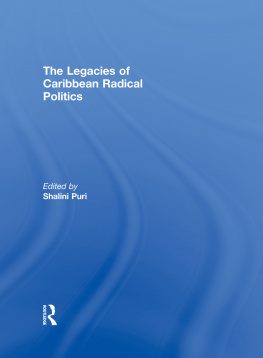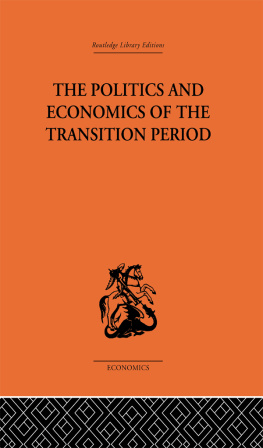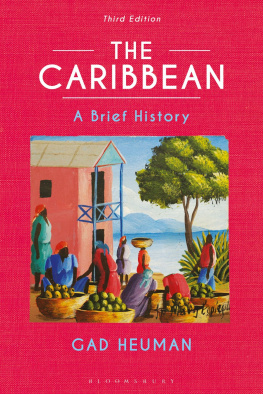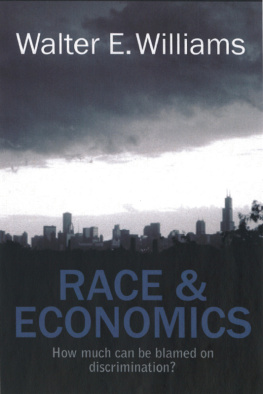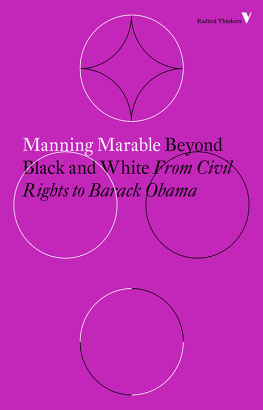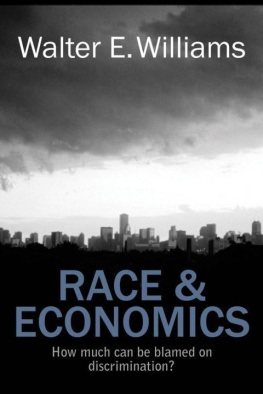The
HAUNTING PAST
Perspective on Latin America and the Caribbean
THE CHAINS OF INTERDEPENDENCE
U.S. POLICY TOWARD CENTRAL AMERICA, 19451954
Michael L. Krenn
A HOLY ALLIANCE?
THE CHURCH AND THE LEFT IN COSTA RICA, 19321948
Eugene D. Miller
QUISQUEYA LA BELLA
THE DOMINICAN REPUBLIC IN HISTORICAL AND CULTURAL PERSPECTIVE
Alan Cambeira
BRAZILIAN LEGACIES
Robert M. Levine
THE HAUNTING PAST
POLITICS, ECONOMICS AND RACE IN CARIBBEAN LIFE
Alvin O. Thompson
The
HAUNTING PAST
Politics, Economics and Race
in Caribbean Life
Alvin O. Thompson
First published 1997 by M.E. Sharpe
Published 2015 by Routledge
2 Park Square, Milton Park, Abingdon, Oxon OX14 4RN
711 Third Avenue, New York, NY 10017, USA
Routledge is an imprint of the Taylor & Francis Group, an informa business
Alvin Thompson 1997. All rights reserved
No part of this book may be reprinted or reproduced or utilised in any form or by any electronic, mechanical, or other means, now known or hereafter invented, including photocopying and recording, or in any information storage or retrieval system, without permission in writing from the publishers.
Notices
No responsibility is assumed by the publisher for any injury and/or damage to persons or property as a matter of products liability, negligence or otherwise, or from any use of operation of any methods, products, instructions or ideas contained in the material herein.
Practitioners and researchers must always rely on their own experience and knowledge in evaluating and using any information, methods, compounds, or experiments described herein. In using such information or methods they should be mindful of their own safety and the safety of others, including parties for whom they have a professional responsibility.
Product or corporate names may be trademarks or registered trademarks, and are used only for identification and explanation without intent to infringe.
Library of Congress Cataloging-in-Publication Data
Thompson, Alvin O.
The haunting past: politics, economics and race in
Caribbean life / Alvin O. Thompson.
p. cm. (Perspectives on Latin America and the Caribbean)
Includes bibliographical references (p. ) and index.
ISBN 0-7656-0012-9 (hardcover) ISBN 0-7656-0013-7 (pbk.)
1. West IndiesPolitics and government. 2. West IndiesEconomic
conditions. 3. West IndiesRace relations. I. Title.
II. Series.
F1621.T5 1997
972.9dc21 96-52984
CIP
ISBN 13: 9780765600134 (pbk)
ISBN 13: 9780765600127 (hbk)
to
HILDA
my loving wife
Contents
I wish to take this opportunity to acknowledge the assistance given to me by Dr Andrew Downes, Dr Michael Howard and Dr Neville Duncan of the University of the West Indies at Cave Hill campus. They read various chapters and made valuable suggestions, which have clearly helped to improve the text. I also owe a special debt of gratitude to my wife for her untiring devotion, understanding and encouragement throughout the arduous process of writing a text of this kind. To her I can only give in return my love.
Alvin O. Thompson
July 1996
| ACS | Association of Caribbean States |
| AFTA | American Free Trade Association |
| CARICOM | Caribbean Community |
| CBI | Caribbean Basin Initiative |
| CDB | Caribbean Development Bank |
| CIDA | Canadian International Development Agency |
| CTO | Caribbean Tourism Organisation |
| EPZ | Export Processing Zone |
| EU | European Union |
| GATT | General Agreement on Tariffs & Trade |
| GDP | Gross Domestic Product |
| GNP | Gross National Product |
| IMF | International Monetary Fund |
| NAFTA | North American Free Trade Association |
| OECD | Organisation for Economic Cooperation & Development |
| OECS | Organisation of Eastern Caribbean States |
| PAHO | Pan-American Health Organisation |
| TNC | Transnational Corporation |
| U. | University |
| US(A) | United States (of America) |
| WTO | World Trade Organisation |
Islands, scars of the waters
Islands, evidence of the wounds
Islands, crumbs
Islands unformed.1
Aim Csaire
Studying the Caribbean past
The study of the past is imperative for any society that hopes to make meaningful progress. As the noted sociologist, Emile Durkheim, observed, It is only in carefully studying the past that we will be able to predict the future and to understand the present.2 C. L. R. James likewise states: The past of mankind and the future of mankind are historically and logically linked.3
Caribbean people are being constantly admonished today by certain groups within our society to forget the more untoward aspects of our past. The trouble with this approach is that, even if it were possible to do so, this would mean forgetting almost our entire past as Caribbean peoples. However, this option is not available to us in any realistic way. The impact of the past is so much with us that we are simply not allowed to forget it. As David Lowenthal rightly observes, [I]n the Caribbean the past is a living presence.4 Vidiadhar Naipaul, reflecting on the situation in Jamaica around 1960, commented: The pressures in Jamaica were not simply the pressures of race or those of poverty. They were the accumulated pressures of the slave society, the colonial society, the under-developed, over-populated agricultural country.5
But Naipaul also touches upon one of the most sensitive aspects of Caribbean life when he asserts: West Indians are frightened and ashamed of the past.6 This is no idle or careless statement; rather it is one that reflects an uncomfortable and uncompromising reality. Orlando Patterson, one of the regions most renowned sociologists, speaks about the haunting recollection of each passing moment which many Caribbean peoples have to endure.7 This statement is particularly well understood by the children of Sisyphus,8 the posterity of those who suffered the prostitution of themselves under the encomienda, slavery and indentureship. As time progresses and our historians, economists, political scientists, sociologists and other researchers dig into our past we shall be faced with more haunting revelations. We have, for instance, only begun to sketch the dimensions of Caribbean slavery. Much more work needs to be done on the psychological and psychiatric effects of that institution on both blacks and whites. Some studies on these have already been done and their conclusions are, to say the least, disturbing.
Perhaps the best contemporary example of the haunting past is what one writer recently referred to as the curse of Columbus or the Columbus jinx in the mythology of the people of the Dominican Republic. Although most of the inhabitants clearly do not believe in the myth, it has gained new currency recently at the inauguration of a new Columbian memorial lighthouse. The death of President Balaguers sister just before the inauguration, and only two weeks after touring the lighthouse, was perceived by some Dominicans as yet another evil omen associated with the structure.

